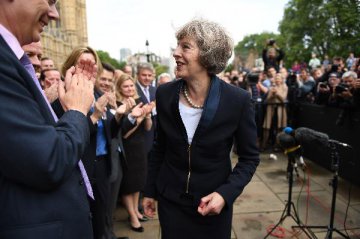
After facing months of demands to spell out her plans for bringing Britain out of the European Union (EU), British Prime Minister Theresa May spelled out her no-nonsense strategy on Tuesday.
In a controversial decision, Britain will leave the European Single Market, control its borders to EU nationals, and end the jurisdiction in Britain of the European Court of Justice.
May wants Britain and EU member states to have free access to each other's goods and services, without the rules that currently apply.
She made it clear that no deal was better than a bad deal. As May delivered her speech, the value of sterling rose sharply, but her message came as a shock to those in the pro-Remain camp who have been demanding access to the European Free Market, even with the strict rules that go with it.
Jeremy Corbyn, leader of Britain's main opposition Labour Party, said May had made it clear that she was determined to use Brexit to turn Britain into "a bargain basement, tax haven on the shores of Europe." "She makes out this is a negotiating threat to the 27 EU countries but it's actually a threat to the British people's jobs, services and living standards. We welcome that the prime minister has listened to the case we've been making about the need for full tariff free access to the single market, but are deeply concerned about her reckless approach to achieving it," said Corbyn.
The Trades Union Congress (TUC), which represents millions of British workers, said it welcomed May's commitment to a vote in parliament on a final Brexit deal.
General Secretary Frances O'Grady said: "Working people are worried they will end up paying the price of leaving the single market. There is real concern that it will be bad for jobs, bad for rights at work, and bad for the living standards of British people."
Richard Tice, co-chair of Leave Means Leave, the group campaigning for a hard Brexit said "Britain must be prepared to walk away if the EU is not willing to secure a deal.
We welcome (May's) commitment to delivering the democratic will of the people and the tough position she has set out ahead of negotiations with the EU."
"We share her vision of an 'independent, self-governing global Britain' outside of the single market, without the restrictive elements of the customs union, and no longer ruled by the European Court of Justice...Her speech highlighted the positive future Britain has outside of the EU."
In its response, Britain's Institute of Directors (IOD) said it welcomed the level of detail provided in May's speech.
Allie Renison, head of Europe and trade policy at the IOD, said May's commitment to providing certainty wherever possible was absolutely vital for business if they were to navigate and make the best of Brexit.
"Whatever the shape of the final trade deal, a smooth and orderly departure is in the whole country's interests, so businesses will support the commitment to a phased process of implementation. While we do not expect a running commentary, firms hope to get periodic updates to maintain confidence as we make our way towards the exit," she said.
"We now know that we will be leaving the single market, and while there will be firms who regret this, they will at least be able to plan on that basis," Renison said.
Former government cabinet minister Nicky Morgan described May's announcement that Britain would leave the European single market as disappointing.
Morgan said the single market had been "hugely beneficial" to the country, but the government had decided that leaving was the "path to be adopted" to control immigration.
May choose historic Lancaster House in London as the venue for her keynote speech, the same place where former prime minister Margaret Thatcher chose to announce that Britain was going to join the European Single Market.
May concluded by saying Britain would not merely be forming a new partnership with Europe, but building a stronger, fairer, more global Britain, adding "and let that be the legacy of our time."




















Latest comments